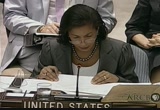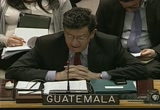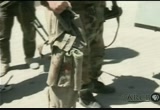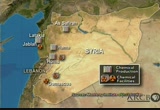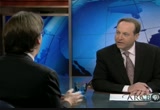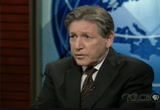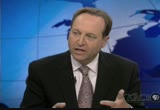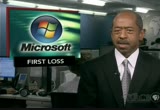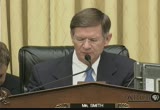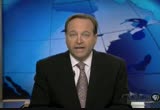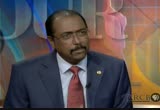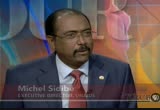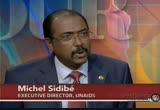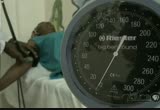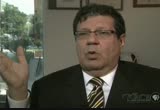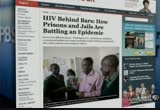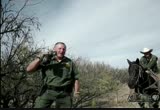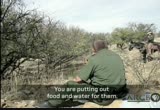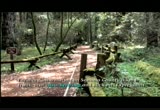tv PBS News Hour PBS July 19, 2012 10:00pm-11:00pm PDT
10:00 pm
captioning sponsored by macneil/lehrer productions >> brown: the obama administration harshly criticized russia and china today for vetoing a u.n. security council resolution aimed at halting the escalating violence in syria. good evening, i'm jeffrey brown. >> suarez: and i'm ray suarez on the "newshour" tonight. we look at the diplomatic stand- off, and the mounting concerns about the syrian government's possible use of chemical weapons. >> brown: then, we examine the use of a one-drug lethal injection on a prisoner last night in texas-- the state that executes more convicts than any other.
10:01 pm
>> suarez: as delegates arrive in washington for an international aids conference, we have two progress reports: gwen ifill gets an update from the director of the united nations program on aids. >> brown: and we assess the epidemic here in our nation's capital, where the infection rate is the highest in the country. >> we have people who will be tested repeatedly in hopes that one of those tests will be negative so that they can say i don't have.i.v. we have people who think they can pray their h.i.v. away. >> suarez: plus, as part of his ongoing series, hari sreenivasan talks with native americans about the search for solutions to the effects of climate change on their tribal lands. >> brown: that's all ahead on tonight's "newshour." major funding for the pbs newshour has been provided by: and the lliam and flora hewlett foundation, working to solve social and environmental problems at home and around the world.
10:02 pm
and with the ongoing support of these institutions and foundations. and... this program was made possible by the corporation for public broadcasting. and by contributions to your pbs station from viewers like you. thank you. >> brown: recriminations flew at the united nations today after a new push to punish syria came to naught again. as diplomacy failed, a syrian human rights group reported more than 250 people died in fighting across the country and damascus itself slid closer to chaos. >> the security council has failed utterly in its most important task on its agenda this year. >> brown: the u.s. ambassador to the u.n. susan rice minced no words after russia and china once again vetoed a resolution that threatened sanctions on
10:03 pm
syria. >> one can only hope that one day before too many thousands more die, that russia and china will stop protecting assad and allow this council to play its proper role at center of the >> brown: it was the third time moscow and beijing have blocked u.n. efforts to make syrian president bashar al-assad stop the attacks on his own people. and this latest veto drew condemnation from country after country. >> mr. president today was an opportunity lost, history will show us price that the people in syria and beyond will have to pay. >> by exercising their veto today, russia and china are failing in their responsibilities as permanent members of the security council to help resolve the crisis in syria. >> ( translated ): in our judgment that resolution was best opportunity and perhaps the only opportunity to put an end to the mindless violence that
10:04 pm
affects the syrian arab republic. >> brown: the chinese and russians argued the resolution would have opened the door to outside intervention and they complained, it said nothing about violence by syrian rebels. >> ( translated ): the draft resolution is seriously problematic with uneven content that is intended to put pressure on only one party. >> reporter: after the meeting the russian ambassador charged western nations are using the rebels as a proxy to gain control of a middle eastern country. >> a major geopolitical battle is being fought on the fields of syria which have nothing to do with the interests of the syrian people, who are not interested in this kind of-- in being the objects of this kind of geopolitical competition. ( gunshots ) ( explosions ) >> brown: in syria today, fighting raged in damascus for a fifth day. the army used helicopter gunships and tanks to strike at rebels who now hold parts of the capital.
10:05 pm
and as the fighting intensified, thousands of people fled the city for the relative safety of the lebanese border. meanwhile, president assad was seen for the first time since a bombing yesterday killed his defense minister and two other top officials. state t.v. showed him swearing in a new defense minister, and wishing him good luck. there was no word on the actual whereabouts of the president or his family. but in washington, for a second day, u.s. officials raised concerns that the syrian leader might be desperate enough to resort to chemical warfare. pentagon spokesman george little: >> i can't speculate on syrian inntions. that being said, we've seen the reckless, depraved and deplorable behavior of the regime that's inflicted terrible violence on its own people. we can't rule out the possibility that they might resort to the use of such weapons. >> brown: syrian rebels have warned that the assad government
10:06 pm
is preparing to use chemical weapons, by distributing gas masks to its forces. joining us now is leonard spector, a weapons and non-proliferation expert with the monterey institute of international studies. and julian barnes of the "wall street journal." jewelian, i want to start with you today, first on today's u.n. vote. what reaction are you getting from u.s. officials? do they have any further steps planned or snobl. >> well, there wasn't a lot of surprise that russia and china made this move today. the russians have been blocking this for a while. officials i've been talking to have said it is almost fruitless to continue to push russia for the solution to this. russia is not going to change its position until the assad regime begins to fall. >> brown: yet they went ahead and pushed for another vote today. >> that's right. but a lot of military officials think it's going t be the events on the ground that will
10:07 pm
drive this forward, not the diplomatic events. >> brown: leonard spector, i want to turn to the chemical weapons question. fill in a bit of the picture. what's known about the size and scope of the program in syria? >> the size and scope is... the quantity of materials hundreds of on thes and the variety of material, everything from the world war i gass so-to-the very modern persistence nerve gases, the slimes, as they say, that will stay in place for a while, for days and remain dangerous. >> brown: and build up over time and for what purposes? what intention? >> principle, this is a response perhaps, to israeli capabilities and it's a very significant symbol of assad's and his father's strength in the region and a way of demonstrating syrian leadership. certainly there's both the military and symbolic side to this. >> brown: you've tracked a chemical weapons facilities
10:08 pm
around syria. tell us what we're seeing. >> i think you're seeing some chemical weapons stores sites. off to the right in the moral rural parts of the country and then weapon production sites towards the left in the more built up areas where most of the fighting has been. the country side, supposedly, is much more in the hands of the free syrian army and if there are chemical weapons sight there is that that have fallen behind enemy lines or insurgent lines you may have a situation where they there may be a transfer of the authority over these sites. >> brown:ulia, your colleagues in the journal reported the other day the weapons were being moved. what more is known? what can you update us on? >> well, the opinions we've talked to are still divided on what this means. there are some who think that this was moving wednesday from sites that were threatened by the rebels to more secure areas. there were others who worry
10:09 pm
that.... >> brown: you mean away from potential insurgents? >> away from the rebels in the insurgent line to safeguard them for the regime. but there are others who think that the movemen was a precursor to potentially using them as a part of the ethnic cleansing campaign or as part of... on the battlefield against the rebels. >> and certainly officials have spoken up two days a row, leon panetta at the pentagon yesterday and again today so some level of concern. >> right. and a clear warning that this real l invite an international response. and that's why some officials think that this is... it will not be president assad who makes the order to use this but only after he falls from power, remnants of his regime might, as last-ditch effort, start to use these weapons. >> brown: inspector, what is the level of concern that you're hearing? >> well, one of the administration people i've talked indicated that there was indeed growing concern about the risk of use. i frankly... when i spoke to the
10:10 pm
congress earlier today felt that that was more farfetched because assad would be so concerned about the possibility of intervention but that seems to have been discounted. even though we've given warnings there's a sense in the administration from what i gather that the risk of use is real. >> brown: what scenarios are being spun out in which they might be used? >> this would be a last-ditch effort to suppress the opposition and/or to cow the civilian population. certainly once they get used in a civilian setting there will be enormous hesitation to challenge the regime. i mean, these are deadly weapons and they will be frightening because they're so different from conventional explosives that we are getting used to. >> brown: are they easy to use? can it quickly be put together? >> well, if there are artillery shls you substitute a chemical artillery shell from a traditional one so that part is easy. sometimes they have to be prepared but these are intended for battlefield use in many
10:11 pm
cases and that means rapid preparation. >> brown: and the ability to scare and kill lots of people. >> absolutely. especially if they're in the open, it could be very deadly and just sew incredible panic. >> brown: does that sound like what they're worried about? and therefore what? what are u.s. officials able to prepare for? >> well that is... one scenario people are very wried about, not just once you use it the panic spreads and you get displaced people, a lot of refugee crisis, that gets much worse as people flee a there's this view that it could be used in the alawite areas where president assad's ethnicity and to clear out sunnis from those areas. there are plans should assad regime fall and should... to have u.s. allies in the region secure some of these sights-- mainly jordan, turkey.
10:12 pm
now should those allies be unwilling, there are contingency plans for the u.s. to secure some of those but that's a scenario the administration is very reluctant and hopes does not come to that. >> brown: this is a whole other potential danger, right? if assad falls, what happens to these things if they fall into who who knows what hands? >> i think what our jobs... in a sense the united states and our allies is to create an environment in which they say under governmental control, is maybe even under the control of e current guardians but a superstructure of the free syrian army or the new government of syria taking charge of them but they're managed by people that understand weapons and can know the inventory and maintain the security around them. so it's a very difficult game between transition on the one hand, trying to preserve as much of the protective measures as you can. we did that somewhere w some success in libya. not complete by any means. >> brown: going back to where we
10:13 pm
started with the day at the u.n. and russia plague the rle is playing, russia is ose to syria. can the u.s. ask rushes for help on this chemical weapons issue in is that possible. >> one would hope so. certainly if there was a risk of loss and you wanted to bring an international team of some kind in you want to have the russians as part of it to reinforce the credibility and not to isolate them but try to get them as part of.... >> brown: last word on that? >> as part of an end game that's how russia could switch to the other side-- by taking a role to help secure these weapons of mass destruction. >> brown: julian barnes and leonard spector, thank you both very mh. and we delve deeper into some of these same questions online where you find the map we showed of possible locations for chemical weaponss facilities. >> suarez: still to come on the "newshour": executing prisoners with a single drug; plus, making progress in fighting aids; tackling the epidemic in the nation's capital and native americans coping with climate change. but first, the other news of the day.
10:14 pm
here's kwame holman. >> holman: officials in bulgaria said today the suicide bomber responsible for the attack on an israeli tour bus had a fake michigan driver's license wednesday's attack at the sofia airport killed seven people and wounded more than 30. security camera footage showed the suspected bomber-- a man with long hair and plaid shorts- - wandering through the airport terminal. that was shortly before the blast. there was no confirmation of the man's identity. israel accused iran and hezbollah militants in lebanon of organizing the attack. iran denied it. olympic organizers in london have yet another problem-- a planned strike on the eve of the games. the public and commercial services union voted today for a 24-hour walkout by airport border guards, next thursday. we have a report from lucy manning of "independent television news." >> reporter: welcome to britain and the olympics. at least, you made it here before the strike sets in. the gold medal for potential a strike the day before the opening ceremony and more
10:15 pm
industrial action threatened during the games. >> reporter: then why have you called a strike the day before the opening ceremonies if you don't want to disrupt the olympics >> we've called a strike because under the u.k. law, once off ballot you have to trigger a dispute within 28 days. >> reporter: nearly 16,000 p.c.s. union members were balloted, only a fifth voted so overall only 11% of all the members wanted strikes and just 15% voted for other forms of industrial action. the union insists there won't be a strike if ministers are prepared to meat them and talk and make progress on issues like job cuts. but the threat hangs over this olympic games and the government knows it. >> i think that is shameful, frankly. they are holding a strike on one what is one of the key days for people coming into the country
10:16 pm
for the olympic games. i believe it's not right for them to hold a strike. >> people should not be striking during the olympics. people should not be disrupting the olympic games. >> reporter: to add to the potential olympic chaos, trying to get to london for the games, well, the drivers of east midland trains are going on a three-day olympic strike. >> it's possible to get support but industry relations we can't always consider public support. we have to consider our members. >> reporter: from security to strikes, the olympics are proving a challenge before they've even begun. >> holman: also today, the government had to put another 1,200 troops on standby for olympics duty, due to a shortage of security guards. in u.s. economic news, jobless claims rose, after a one-week lull, and factory activity slowed more than expected in the mid-atlantic region. still, wall street managed a limited rally. the dow jones industrial average gained 34 points to close at 12,943. the nasdaq rose 23 points to close near 2,966. microsoft reported its first loss as a public company, nearly $500 million in the second quarter.
10:17 pm
it followed a huge charge against earnings due to weak online ad business. ford motor company is warning owners of some of its 2013 escapes to stop driving them immediately. the small s.u.v.s may have faulty fuel lines that can crack and leak, causing engine fires. the automaker said it's recalling more than 11,000 escapes. they have 1.6 liter engines and were built between april and early july. the head of homeland security janet napolitano today fended off republican criticism of a new immigration policy. last month, president obama announced the government would mostly stop deporting illegal immigrants who arrived in the u.s. as children. at a house hearing today, republican lamar smith of texas insisted the change will do more harm than good. $the administration's amnesty agenda is a win for illegal immigrant bus a loss for americas. when illegal immigrants are allowed to live and work in the
10:18 pm
u.s. u.s., unemployed american workers have to compete with illegal immigrants for scarce jobs. with 23 million americans unemployed or underemployed, this amnesty only makes their lives harder. >> holman: napolitano argued the change will give young immigrants a pathway to citizenship and let law enforcement make better use of resources. >> it's not amnesty. what this is is... it's really the development that we have been looking at over the last several years of how do we clear out the backlog of non-priority cases so that we can focus on criminals, recent border crossers, repeat violators. >> holman: the new policy could affect more than a million illegal immigrants in the u.s. the u.s. is on track to have the worst year for whooping cough in more than five decades. the centers for disease and control and prevention said today that nine children have died. and nearly 18,000 cases have been reported. that's more than twice the total
10:19 pm
cases for all of last year. children usually are vaccinated against whooping cough, but the c.d.c. urged adults to get immunized as well. those are some of the day's major stories. now, back to ray. >> suarez: texas ecuted a death row inmate with a single sedative drug for the first time last night. he was 33-year-old convicted murderer yokamon hearn. the state had used pentobarbital as part of a three-drug cocktail in lethal injections since 1982 but never on its own. the change in policy follows other states nationwide that have made the same switch because of lack of supply of another lethal drug. the georgia department of corrections made the same change this week to the single dose, warren hill and postponed the execution of inmate warren hill until monday. michael graczyk of the associated press has witnessed more than 300 executions in the state of texas. i spoke with him a short time ago. michael graczyk, welcome.
10:20 pm
what argument did yokamon hearn's lawyers use to delay the carrying out of the execution in order to stop it all together? >> well, they had raised two specific questions for the supreme court. the first one was that he had suffered fetal alcohol syndrome that had stunted his mental development as a result of his mother taking quantities of alcohol when she was pregnant with him. although his i.q. tests showed that he was above the levels we generally consider the threshold for mental impairment they said that 40 that should be considered... the fetal alcohol syndrome should be considered as a circumstance to allow the i.q. tests to be somewhat considered less effect. the second argument was that his attorneys at his trial and early
10:21 pm
in his appeals process did not pursue the arguments about his background when he was growing up and the fact that he had a mental impairment that probably should have stopped his execution at least in their judgment. and there were conflicts in federal appellate decisions that needed to be resolved that impeded their ility file those appeals the last minute. >> suarez: these are the kind of arguments that are making their way to the supreme court for relief for stays. did they make any headway? >> didn't appear to. the supreme court issued a very brief one paragraph almost identical ruling that rejected each of the appeals and that happened about three and a half hours before hearn was put to death so they were unsuccessful in their attempts to delay the punishment. it had beentopped several years ago to pursue his mental
10:22 pm
impairment claim bus those were resolved as well and not that allowed the state to set the new date for yesterday. >> suarez: it's been getting a lot of attention in the wake of yokamon hearn's death. is the use of a single drug to bring about his death... why is that significant? >> i don't know why it's really significant. i think in texas, at least, it shows that the state was able to successfully carry out president death penay in ts case and move on from the traditional three-drug procedure that they had used since the death penalty resumed here back in 1982. certainly there had been arguments raised earlier. in other states... i believe there are four that went to a one-drug procedure within the past year or so. mr. hearn had excellent attorneys. i think if they thought there would have been some legal
10:23 pm
avenue to pursue here in texas they would have done so but ey chosnot to purs any appeals based on the drug switch. >> suarez: you were a witness to the execution using the single drug as opposed to the three-drug cocktail. was there any difference in the manner of death? >> didn't appear so. some of the procedural issues were a little bit different. we've become accustomed to seeing is that the execution itself takes about ten or 12 minutes. yesterday we were in the death chamber for about 25 minutes and 20 minutes of that was... prison officials were administering the drug. so the length of time was the biggest difference. as far as the reaction of the inmate it was nothing at all different than what we have become accustomed to seeing with the previous procedure. he was breathing deeply within
10:24 pm
the first seconds of the drug being administered and essentially went to sleep and began snoring and the audio nature of the snores became less pronounced and finally there was no noise and no movement at all. and then we stood there for roughly 20 minutes while the remainder of the drug was administered and after about three or four or five minutes later a physician came in and pronounced him dead. so the duration of the entire procedure was significantly longer, almost twice... greater than twice... twice the amount of time we've become accustomed to. >> suarez: mighting there be a problem with getting pen toe barbital in the future? the producer under pressure around the world stop selling it foreople who might use it for executions. >> i suspect that may be the case and in some of the other state there is's already talk of being prepared to use a different drug, propofol which
10:25 pm
has become notorious as the drug that took michael jackson's life. so i think there are already movements in that direction. i know here in texas, at least, the state has said it had enough of the pentobarbital to carry out 23 executions, beginning with the one that occurred last niting so the ari beeve eight on t schedule now for at least this year and the average in the state has been in the mid to upper teens so at least here in texas i don't anticipate that becoming an issue for some time. >> suarez: michael graczyk of the associated press, thanks for joining us. you can find more information about the two sides of this debate on our web site. we've posted two q&as with representatives from the death penalty information center and the criminal justice legal foundation. >> brown: next, two takes on aids today here and around the world. we begin with a global progress rert. more than three decades after the first cases were reported. gwen ifill has that.
10:26 pm
>> when researchers, political leaders and advocates gather in washington next week for the world's largest aids meeting there will be something newton agenda-- optimism. aids deaths have declined, the rate of new infections among children have been falling and more than eight million people in poor and middle income countries are receiving crucial life-saving drugs. buthe globalictu remains grim. worldwide more than 34 million people have h.i.v. 23 million of them in subsaharan africa. last year, 1.million people died from the disease and millions still can't get the drugs they need. michel sidibe is the director of u.n. aids which just issued the latest report in all of this and he joins me now. thank you for joining us. >> thank you very much. >> ifill: the new numbers, do they show we're turning the tide? >> i think we are breaking the backbone of this epidemic. it is the first time that we can
10:27 pm
say that we have 56 countries worldwide with stabilized and reduced significantly the number of new infection. young people are taking the responsibility, changing their behavior and we're seeing reductions by almost 25% amongst those young people. even 50% in countries like south africa which is just showing that we are going win if we remain committed to these bilization to find the epidemic. >> what do we think is behind this? is it a change in behavior? young people realizing or others realizing what they should and shouldn't do or is it access to medication or care? >> i think it's many factors. let me say that the compassion and mobilization of american taxpayers have been producing the results.
10:28 pm
you have been able to put resources out there when people were not thinking how we could put people on treatment. ten years ago it was $15,000 per person per year. but because you believed that we need to save lives and you did it today we're seeing the result. but also we are seeing president obama's full commitment to make sure that we can come with a new narrative which is sharing responsibility, making sure that we sustain our gain and that is also starting to pay off. >> but that's what the u.s. is doing to help what about what these nations in subsaharan africa are willing to do for themselves. ten years ago thabo mbeki from south africa wouldn't even admit that the h.i.v. virus caused aids. has that changed? >> that changed.
10:29 pm
i think try u.n. aids is trying to work with african countries. we have 33 countries in africa who have been able to increase their domestic investment by 50% during the last five years south africa is a very good example. just last year put $2 billion to fight h.i.v. in south africa. we would have never been e believed that one. and today we are seeing that happening also in the emerging nation. we have been working with china, india and brazil, russia. all of those countries today instead of waiting for resources coming from global funds are paying for their aids response. this is the change. >> let me ask you a bit more about something other than money which is this question. for a long ti the was stigma against people who disproportionately suffer from h.i.v. which is to say drug abusers and homosexuals and prostitutes and people who no self-respecting african leader
10:30 pm
wanted to stand on the age with. has that changed? >> i think what is very frustrating me is not just in africa, in russia, in central asia, in different parts of the world, we are seeing unfortunately that it is a success for most at risk population. man having sex with man, people who inject drugs or sex worker or r denied their access to services. they are to hide themselves. they are to go underground and that's not helping us. for example, in the last ten years we had almost 250... (inaudible) new infection in eastern europe and central asia. >> ifill: have costs dropped also? when you say access and you say many countries have stepped up and helped with this, has it become less expensive now to get that care? >> yes, n yes ago like i was saying we're talking about
10:31 pm
almost $15,000 per person per year. today we are talking about less than $100 per person per year. and that changed the dynamic response. today we are having eight million people on treatment because we have been able to also create this which helped us to deal with trade issues but also to deal with services because of providing services. >> ifill: as the head of u.n. aids, you can look back at what's happening in the last ten years, look forfor a moment to what should be happening. >> i think for me it's very clear. it's a vision of zero new infections, zero death due to h.i.v. and zero discrimination because when we discriminate, it affects our ability... (inaudible) it's about social justice, it's about redistribution of opportunities.
10:32 pm
it abo making sure that what we are building is (inaudible) and i believe that is the only way we can have stability in many parts of the world and it can help to reform the global health response. >> ifill: michel sidibe, executive director of u.n. aids, thank you for joining us. >> thank you very much, it was a pleasure. >> suarez: our second story is about the crucial role of testing for h.i.v. here. next week's global aids conference marks the first time it's been held in the u.s in more than two decades. but when tens of thousands of people descend on the nation's capital, they'll be visiting a place that's more than just a host city. many neighborhoods in washington d.c. have felt the pain of aids acutely and experts are looking for ways to turn the epidemic around. i worked on this report with our partner, global post. >> suarez: this week, an estimated 1,000 americans were newly infected with h.i.v., the virus that causes aids.
10:33 pm
next week, another thousand will join the estimated 1.2 million people in this country who are already h.i.v. positive and those new infection numbers haven't changed in ten years. while there's been steady progress in moving the disease from a death sentence to a chronic, treatable condition, washington d.c. has remained the u.s. state or territory with the highest infection rate. >> d.c., like the rest of urban america has a very serious epidemic on going. two or three people are infected every day in the district of columbia. >> reporter: dr. gregory pappas is the senior director at the d.c. health department in charge of h.i.v. and aids. >> d.c. is not a country, it's not a state, it's not even a city. we're a jurisdiction. we're a cut out of the center city. we are 600,000 people within a metropolitan area of five million people. and we happen to be a cut out where there are a lot of gay people and lot of disenfranchised black and hispanic people, poor people, poverty and poor education are the main drivers of new
10:34 pm
infections in the united states. >> suarez: 3% of all d.c. residents over 12 years old are h.i.v. positive and that number zooms higher for poor people, black men, and black women. the neighborhoods across the anacostia river include concentrated pockets of poverty, and hiv infection. it's been like that since the earliest years of the epidemic. but global post reporter john donnelly, who covers the aids beat around the world, says city officials are adjusting their approach by incorporating ideas that are working in less developed countries. testing is an important one. >> and what's happening is a lot of the lessons that the united states really learned from its global fight in aids in africa are being brought back home. back to anacostia, back to the bronx, back to san francisco and miami. and there are using some of the tactics to really reach the population to educate them, to let them know about the dangers
10:35 pm
and to make sure that they themselves know if they are hiv positive or not. >> suarez: street health educators funded by the d.c. government, federal and private grants, fan out on the streets of a washington neighborhood. >> do you want to do this free h.i.v. testing? >> yes. >> suarez: knowing your h.i.v. status is now believed to be one of the most powerful weapons in the aids prevention arsenal. it's simple to test, and fast. >> here you go, here's some condoms. we're doing free h.i.v. testing. >> suarez: terrence young is the manager of testing and field operations for the community education group. >> we've seen a constant increase in our annual amount of tests and annual amount of positives diagnosed. we're in these neighborhoods constantly. we're not coming one time and saying, "hey look guys you need to get tested" and people never see us again. people who have grown accustomed to seeing us in the communities. its to the point now where literally my staff will pull up and we have to do very little if
10:36 pm
any outreach. they know what we're doing. >> do you think its important to get tested for h.i.v.? sure. because i would like to know if something is wrong with me so won't have to give something to someone else. >> suarez: here's why testing matters. in washington d.c., a very high percentage of people are insured, and life-saving anti- retroviral drugs are widely available. but unless you know your status, you can't begin to take the drugs that fight your infection, or protect your sex partners. risky sex is risky anywhere. but you take an even bigger chance anywhere the infection rate is high, which makes the and a high percentage of hiv positive people, don't know their status. so street health workers like donald head deliver, over and over, one simple message: get tested. if you're positive, we'll get you help. >> people come in and they get tested right and sometimes you
10:37 pm
get preliminary positive. we have what's called the red carpet service where we would take them from that chair that they are sitting in and immediately take them to care where they can get their doctor, they can get mental health, they can get everything that they need right concerning the virus and we have to stick with them up to a year taking them their appointments. >> suarez: two years ago, head got the news he now has to break to others, his test was positive. he says the news can throw people into a panic. >> what actually gets them to become a little calm is when i tell them that i'm h.i.v. positive, right? and they kind of come around a little bit, right, because they look at me, "nah, you ain't hiv positive." it's something that lives or originates in the bloodstream and you can't look at me and tell whether i have it or not. >> suarez: dr. lisa fitzpatrick of howard university said one of the biggest hurdles to treating the infection is stigma.
10:38 pm
fear and shame keep too many patients away from the doctor until their disease has progressed. >> i ask them what took you so long to get here? and they say well i didn't want to talk about my aids or i didn't want to hear you telling me i have aids. we have people who will be tested repeatedly in hopes that one of those tests will be negative so that they can say i don't have h.i.v. we have people who think they can pray their h.i.v. away. so there are many, many barriers to getting people to accept that h.i.v. is a reality in the community but also to accept that are things that you can do about it. you can get treated. you can live a long time. you can be healthy and take care of your family. >> suarez: dr. wafaa el sadr has done decades of aids research in the u.s. and the developing world. she said outreach done in africa-- part of the president's emergency plan for aids relief, or pepfar, made progress, slowing the spread of the disease. dr. wafaa el sadr leads the
10:39 pm
international center for aids care and treatment programs at columbia university-- a pepfar partner. >> i realize sometimes when we say that the epidemic in parts of the united states is similar to epidemics in parts of africa that this is quite alarming statement and maybe disturbing statement to many but its true and there are lessons learned, lessons that we can learn from the response in some african countries. >> suarez: she says pepfar-style outreach could work in high- incidence american neighborhoods. >> to actually reach out, go to the homes, in those most affected communities and approach people, talk to them about h.i.v., talk to them about the importance of knowing whether they have h.i.v. or don't have h.i.v. and if you find out that they are h.i.v. infected linking them to care and if you find out that they don't have h.i.v. infection then to offer them prevention interventions. >> suarez: african countries have had more success
10:40 pm
normalizing testing, building down stigma, and talking openly about aids, and new infection rates are dropping. doctors specializing in aids prevention say the great leap forward in testing in the u.s. will come when a screening for hiv becomes as routine during a doctor visit as a blood pressure or cholesterol check, as is becoming more and more common in sub-saharan africa. dr. pappas says washington still isn't close to efforts in there. >> people go to the doctor in the district of columbia and they are not getting an h.i.v. test. the issue it's got to be standard practice. >> suarez: once an h.i.v. positive person has been identified, these experts say it's vitally important to get people on medication, and keep them taking it properly, to prevent drug resistance again, the u.s. can look to africa for examples. >> africa actually excels at staying on their medication. it was early in the epidemic people said, ", well you can't do h.i.v. in africa people won't
10:41 pm
take their pills on time well african communities actually have mobilized to support one another. there are people village workers that go from house to house and encourage people to take their medication. that same sort of approach that community based approach to helping people stay in care is what we've got to get to in the united states. >> reporter: 30 years into an epidemic that has so devastated so many african countries, there's a kind of irony in seeing u.s. cities like washington eye some of the methods being used in africa. but with no complete cure available, researchers emphasize that knowledge, prevention and treatment all work hand in hand. online, we examine how two very different places deal with aids. washington, d.c. and zimbabwe are literally worlds apart, but they both have some of the highest h.i.v. rates in the world and face remarkably similar challenges. tonight, we explore how prisons are dealing with the disease. visit our website for much more of our joint reporting with global post ahead of this
10:42 pm
weekend's aids conference. >> brown: there's another big meeting taking place in washington this week. native populations from around the u.s. convened at a conference on the impacts of climate change. hari sreenivansan has that story. >> sreenivasan: our series on "coping with climate change" has included multiple examples of how native american populations are feeling the impacts and adapting. we took you to coastal louisiana where tribal people are experiencing relative sea level rise in a very personal way. their islands are shrinking and their burial grounds will soon be underwater. the quiliuete tribe in washington state, whose reservation was down to its last square mile until they recently won rights to move to higher ground in the nearby national park.
10:43 pm
last night, we showed you how the swinomish tribe is trying to plan ahead and adapt to faster glacial snow melts, higher stream temperatures and changes in fishing grounds. anges are being felt by native peoples throughout the country and it was the reason for the first stewards conference at the smithsonian museum. we sat down with a few representatives. joining me here at the national museum of the american indian to tell us how their communities are coping with climate change are micah mccarty from the makah tribe in washington, kitty simonds from hawaii, mike williams from the akiak native communities in alaska, and jeff mears from the oneida tribe in wisconsin. thanks so much for joining us. in your lifetimes, what have you seen change, perhaps in the areas that you've grown . what's something that you can point to and say this is what it used to be when i was a child and here's what the situation is today.
10:44 pm
>> i guess for me growing up in hawaii the changes were really with the fish population. we used to have much larger fish, different species. they seem to have changed, and i'm not sure if it's climate change or the visitors feeding our fish food that they shouldn't be feeding them. so for me it's that because we always ate fish at least three or four times a week. so that has been a large change and the fishermen have to go farther and farther out to catch fish, in fact outside the 200 mile zone. and we have fewer fish around the coral reefs. those actually were the best eating fish for us. they were small and we would fry them up and they were delicious. well, there's very few of those left. >> okay, i'm 41 years old. and i've probably been to at least 39 makah days. makah days is our celebration annually at the end of summer. and it always rained on sunday. and one year in 2006 in my first
10:45 pm
council, we had a drought that lasted until the end of october. and we had to declare a state of emergency with the governor of the state, norm dicks, and what was the real concern was the watershed for the salmon hatchery. and we had some very serious concerns with our biologist that the eggs in the returning runs might not be viable by the time the rains came. and that was the first time i had ever heard of something like that happening. >> sreenivasan: mike williams you've been through more than a dozen iditarods 14 iditarods. you've literally seen alaska in a way that most humans will never get a chance to see. what are the differences that you've seen in your lifetime? >> in 50 years of my observation i've seen a lot of changes from cold winters and ice that was very safe into thinning of ice and we had to move in some cases further north. our hunters are going out
10:46 pm
further like in shishmaref they are having to go 90 miles out to find ice to get their walrus and their seals and they're having to risk more going out further into the sea and the weather hits and that's when the loss of life occurs. >> sreenivasan: jeff mears, you're sort of representing all those inland nations and inland communities that might not have these same sort of fishi or coastal problems but what are some of the impacts on climate change on an inland tribe such as yours? >> so since i've been here the stories that we hear in alaska, it's immediate and it's heartbreaking what they're going through. what we're looking at is planning for the future so the tribe, the oneida tribe in wisconsin like any other government provides a lot of services. we have a police department a school a health center. we have a wastewater treatment plant. like most governments, we have to learn to plan to design our infrastructure to withstand the impacts of climate change and in
10:47 pm
our case its going to be similar to the weather we've seelately with increased hot weather events, precipitation much heavier and in much shorter periods of time, and we've seen what can happen in duluth recently where a seal was flushed right out of the zoo. there's ten to 12 animals that drowned at the zoo because of a ten inch rain event that happened over two days. short term rain events can be as powerful as hurricanes so well be looking at our infrastructure to design our infrastructure to withstand those things. >> sreenivasan: micah, speaking of a little bit about that adaptation, how are coastal communities along washington or the west coast in the united states preparing or adapting. how are they trying to synchronize some of what they've already known for hundreds of years with modern day science? >> well, i think one of the biggest challenges is just realizing what's happening because our tribal communities and our natural resource divisions do co-management with the state and the feds. as wisconsin is working to adapt its like we have to come up for air and look around and how were going to start strategizing our adaptation.
10:48 pm
but my concern is looking forward to the future. what can we do about ocean acidification? what can we do to really create a safe haven and integrate some of the technologies that are replicated around the world and perhaps become a model that other coastal communities world wide can continue to depend on the ocean. >> sreenivasan: kitty simonds you probably know about ocean acidification and coral reef bleaching and perhaps even the introduction of foreign species. what sort of interplay that has? in terms of the coral reefs you know you can replant them. and that's you know, because of the coral bleaching they're going to have to think of ways of replanting the coral someplace else around the island. and they do thrive so that is one of the solutions in terms of the coral reefs. they're very important to the islanders because of the fish that live around the coral reef are the fish that the islanders eat.
10:49 pm
once that goes away the fish goes away. they lose their culture. >> sreenivasan: mike williams, so some of these tribes are able to move inland but that's not a cheap proposition to try and pick up your entire village or your way of life and move inland. what happens to these communities when there isn't that money? do these tribal people scatter? >> the village of nutak is beginning to move and it's a slow process and the communities are having mixed feelings about moving from where they wereere born. and where i was born our old house was on the river and it fell in, but we're having to move further inland and the infrastructu is very expensive. >> sreenivasan: jeff mears help put this in some economic perspective.
10:50 pm
for a tribe like yours, trying to plan for these changes in the climate as it changes and the types of things you have to plan for in your community what does that cost you and ultimately what does that cost the local state or federal governments? >> so some of the stuff we've talked about obviously is the infrastructure there will be a certain cost for example to make sure our wastewater treatment plant is designed. it's already in place now to make sure that we protect it from water that could wipe it out. there's examples of infrastructure like wastewater treatment plants being inundated with water, cryptosporidium outbreaks on public health. the costs just keep getting escalated if you don't do anything so the upfront costs i think are far less than if we don't do anything. >> sreenivasan: all right, jeff mears from the oneida tribe in wisconsin, mike williams from the akiak peoples in alaska, kitty simonds from hawaii, and micah mccarty from the makah tribe in washington. thanks so much for joining us. >> thank you and aloha. >> brown: you can find all our climate reports on our "coping with climate change" page on our website.
10:51 pm
>> suarez: finally tonight, a look ahead to tomorrow's edition of "need to know". it's the result of a five-month investigation into charges of physical and sexual abuses of migrants by some members of the u.s. border patrol. the correspondent is john larson. here's an excerpt. >> this is the part of u.s. customs and border protection's mission that rarely makes headlines.év our southern border. >> reporter: this public relations video champions the work of the border patrol's search, trauma, and rescue teams. their mission: to provide life-saving aid to distressed migrants along the border. >> building the capacity to save lives. >> reporter: but that video is in stark contrast to this video. >> i don't care! i don't care at all! >> reporter: this is a u.s. border patrol agent named david kermes. the video shot by volunteers for
10:52 pm
the advocacy group "no more deaths" in 2009. >> this is not your water and i can take it. >> reporter: the organization places water where clusters of migrant bodies have been found. they hope the water might save human lives. but the border patrol agent has a different idea. >> thank you very much. i'm thirsty. does your horse want some? come on. come on. >> reporter: volunteers have found their water containers slashed or empty. when they complain about it to the border patrol this february they were promised the border patrol chief in tucson would direct all agents to leave the water alone. but the destruction continued so they placed hidden cameras near the water and in may recorded this. publicly the patrol insists it does everything it can to protect the lives of migrants. but this video calls that into question. >> people make my job harder.
10:53 pm
catching people. putting out food and water for them. aiding and abetting felons coming into the country. >> reporter: for the record, coming into the country illegally one time is not a felony. and putting out water is legal. but there could be another explanation. this is agent kermes' facebook page where he publishes border patrol photos of migrants in the desert saying "run you little bus tardz." cartoons depicting urinating on a mexican holiday and publicly insulting the president of the united states. if a border patrol agent is found guilty of unprofessional or offensive behavior, discrimination based on one's nationality or breaking the patrol's policy on social media an agent could be reprimanded or fired. so we asked agent kermes about his facebook page. he said that if we don't look it don't look at it. yet minutes after we finished
10:54 pm
speaking with him the images in question were removed. >> suarez: "crossing the line at the border" airs tomorrow night on most pbs stations. you'll find a link to "need to know" on our website. >> brown: again, the major developments of the day: russia and china again vetoed u.n. sanctions on the syrian government. meanwhile, fighting raged in damascus and across syria. an opposition group reported more than 250 people were killed. border guards at british airports called a one-day strike for next thursday-- the day before the summer olympics open in london. and the centers for disease control warned the u.s. is on track to have the worst year for hooping cough in more than five decades. online, paul solman tries to make sense of campaign spending. kwame holman has the details. >> holman: is campaign spending a bad idea and a waste of billions of dollars, or is there some economic benefit? find out on our kingense page. pl, what lessons can today's young people take from the experiences of civil rights leaders during the 1960s?
10:55 pm
judy woodruff takes on that question in her weekly blog post, judy's notebook. all that and more is on our web site: newshour.pbs.org. ray? >> suarez: and that's the "newshour" for tonight. i'm ray suarez. >> brown: and i'm jeffrey brown. we'll see you online and again here tomorrow evening. with david brooks and e.j. dionne among others. thank you for joining us. good night. major funding for the pbs newshour has been provided by: ♪ ♪ moving our economy for 160 years. bnsf, the engine that connects us.
10:56 pm
and by the alfred p. sloan foundation. supporting science, technology, and improved economic performance and financial literacy in the 21st century. and with the ongoing support of these institutions and foundations. and... this program was made possible by the corporation for public broadcasting. and by contributions to your pbs station from viewers like you. thank you. captioning sponsored by macneil/lehrer productions captioned by media access group at wgbh access.wgbh.org
166 Views
IN COLLECTIONS
KRCB (PBS) Television Archive
Television Archive  Television Archive News Search Service
Television Archive News Search Service 
Uploaded by TV Archive on

 Live Music Archive
Live Music Archive Librivox Free Audio
Librivox Free Audio Metropolitan Museum
Metropolitan Museum Cleveland Museum of Art
Cleveland Museum of Art Internet Arcade
Internet Arcade Console Living Room
Console Living Room Books to Borrow
Books to Borrow Open Library
Open Library TV News
TV News Understanding 9/11
Understanding 9/11


